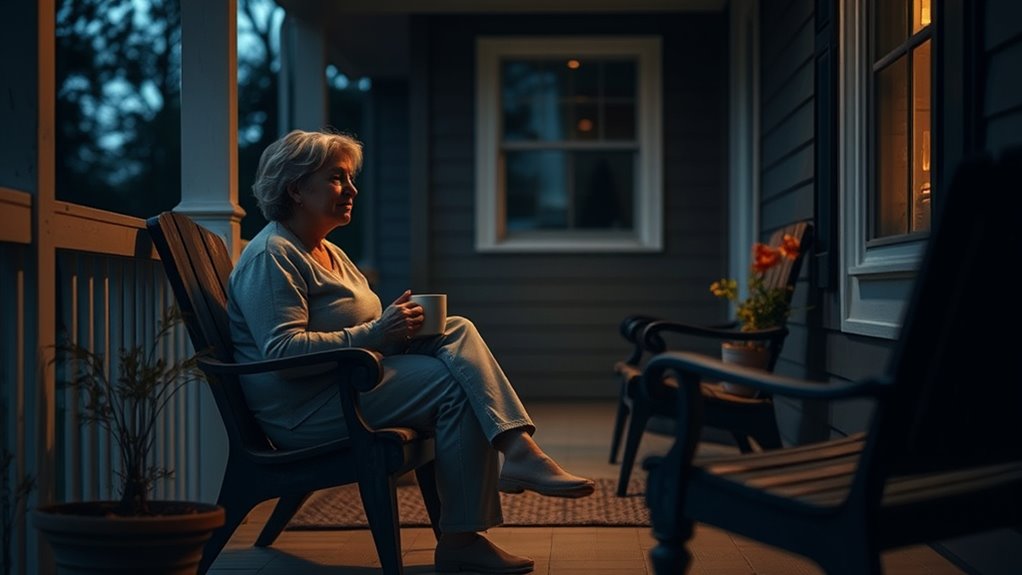To manage isolation and loneliness as a caregiver, connect with support networks like groups or online communities to share experiences and advice. Establish self-care routines that include activities you enjoy, such as exercise or hobbies, to maintain your well-being. Creating a sense of normalcy through regular routines helps foster emotional stability. Communicate your needs openly to family and friends to receive help. Continuing to explore these strategies can empower you to stay connected and resilient in your caregiving journey.
Key Takeaways
- Connect regularly with support groups or online communities to share experiences and reduce feelings of isolation.
- Establish daily self-care routines like reading or exercising to promote emotional and physical well-being.
- Incorporate enjoyable activities into your schedule to create routine and maintain a sense of normalcy.
- Communicate your needs clearly to family and friends to receive practical help and emotional support.
- Prioritize self-care to build resilience, improve mood, and sustain your caregiving capacity over time.

Caring for a loved one can be deeply rewarding, but it often leads to feelings of isolation and loneliness. When your days revolve around constant caregiving tasks, it’s easy to feel cut off from your social circles and personal interests. That’s why building support networks is essential. Connecting with other caregivers, whether through local support groups or online communities, can remind you that you’re not alone in this journey. Sharing experiences, advice, and simply venting can lighten your emotional load and provide practical insights that make your responsibilities more manageable. These networks serve as a fundamental lifeline, helping you stay connected and emotionally supported amid the challenges of caregiving.
Alongside support networks, establishing regular self-care routines is indispensable. It’s tempting to put your needs last when caring for someone else, but neglecting yourself only amplifies feelings of loneliness and burnout. Carve out time daily or weekly, even if it’s just a few minutes, to do something that rejuvenates you—whether it’s reading, exercising, meditating, or pursuing a hobby. Prioritizing self-care isn’t selfish; it’s necessary. When you take care of your physical and mental health, you’re better equipped to handle stress and maintain a positive outlook. Incorporating proper lighting and technology into your environment can also create a more comfortable and calming space for your self-care routines. Creating a routine that includes things you enjoy can also give your days structure and a sense of normalcy, helping you feel more grounded.
It’s equally important to communicate your needs to those around you. Don’t hesitate to ask for help from family, friends, or your support network. People want to assist, but they often don’t know how unless you tell them. Sharing your feelings and asking for specific help can relieve some of the isolation you might feel. Remember, caring for yourself isn’t a sign of weakness; it’s a crucial part of being a resilient caregiver. By actively cultivating your support networks and sticking to consistent self-care routines, you create a buffer against loneliness. These steps empower you to stay connected, maintain your well-being, and find moments of joy even amid the demands of caregiving. Ultimately, nurturing your own needs helps you provide better care and sustain your emotional health over time.
Frequently Asked Questions
How Can Caregivers Find Time for Self-Care Daily?
You can find time for self-care daily by prioritizing your needs and creating simple routines. Use your time management skills to schedule short breaks for activities like stretching, meditation, or a quick walk. Even just a few minutes each day can make a big difference. Incorporate self-care routines into your daily schedule, and don’t hesitate to ask for support to guarantee you maintain your well-being while caring for others.
What Are Effective Ways to Build a Support Network?
You might be surprised how quickly your support network grows when you tap into peer support groups and explore respite care options. Reaching out to fellow caregivers not only offers understanding but also opens doors to new connections. Respite care provides essential breaks, making it easier to build and sustain relationships. Stay proactive—your support network can become a lifeline, strengthening your resilience and easing your caregiving journey.
How Do I Handle Feelings of Guilt Related to Loneliness?
You can handle feelings of guilt by building emotional resilience and practicing guilt management techniques. Remind yourself that caring for others is a valuable act, and it’s okay to need social time too. Allow yourself to acknowledge these feelings without judgment, and focus on self-compassion. Connecting with support groups or a counselor can help you process guilt, strengthening your emotional resilience and making loneliness easier to manage.
Are There Community Resources Specifically for Lonely Caregivers?
Think of community resources for lonely caregivers like a lifeline in a storm. Many areas offer local support groups, peer groups, and online forums designed just for caregivers. These resources connect you with others who understand your struggles, providing emotional support and practical advice. Check with local hospitals, senior centers, or caregiver organizations—most offer free or low-cost programs to help you feel less isolated and more supported.
How Can Technology Help Reduce Caregiver Isolation?
Technology can profoundly reduce your caregiver isolation through virtual support and online communities. You can join online forums or social media groups where others share similar experiences, offering advice and emotional support. Virtual support groups provide a safe space to connect without leaving home, helping you feel less alone. Utilizing video calls, messaging apps, and online resources keeps you engaged, connected, and supported, making caregiving more manageable and less isolating.
Conclusion
Remember, you’re not alone in this. Reaching out and building connections can ease feelings of isolation and loneliness. It’s okay to ask for help and take breaks—you can’t pour from an empty cup. As the saying goes, “A problem shared is a problem halved.” By tending to your own well-being, you’ll be better equipped to provide the care and support your loved one needs. Keep in mind, caring for yourself is just as important as caring for others.









